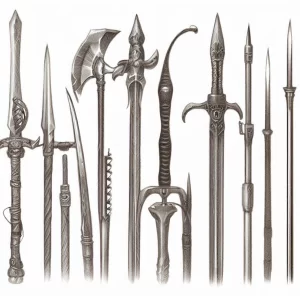
Paladins to Be
In the world of Dungeons & Dragons, a Paladin is a paragon of virtue and valor, a fusion of a fearless warrior and a divine spellcaster who have commandments to guide their behavior. But what truly sets a Paladin apart is the sacred Oath they swear, a binding pledge that shapes their destiny and carves out their place in legend.
Imagine a knight encased in gleaming armor, her sword glowing with divine energy, as she vows to protect the innocent and uphold justice-that's the Oath of Devotion. Or picture a grim avenger, relentless and unwavering, pursuing malevolent forces to the ends of the earth-that's the Oath of Vengeance.
These oaths aren't just words; they're the soul of the Paladin, granting them divine abilities that can turn the tide of battle and inspire entire armies. From channeled divine powers that can banish evil or heal wounds, to potent auras that bolster their allies, each Oath offers a unique set of skills and spells that turn Paladins into heroes-or sometimes anti-heroes-of epic proportions.
And it all culminates in a breathtaking capstone ability at high levels, a moment where the Paladin becomes the very embodiment of their Oath, a living legend whose deeds will be sung for generations. An Oath isn't merely a set of rules; it's a narrative force that drives Paladins forward, fueling their quests, shaping their decisions, and defining their legacy. So, when you play a Paladin, you're not just picking a class; you're choosing a path that will make your character unforgettable.
1) Paladins Shalt Accept the Counsels of Thy Mentor and Obey All Commandments.
From the ages prospective young knights were often sent to the keep of a neighboring baron, where they were instructed in both clerical and military matters. These tutors were available for aid and advice throughout the knight's career including offering spells to assist (i.e. Resurrection), and in return he was expected to avail himself to perform certain services for them.
To reflect this, the DM should make available to the Paladin player character a lawful good Cleric of at least 10th level to serve as counselor. This Cleric would have his own religious stronghold and too many responsibilities to do any traveling, and so would be unavailable for anything other than informational and curative spells.
Note: Player character Clerics of 13th level who request to have a Paladin in their tutelage should be reminded that a mentor Cleric is always on call, and such a role will severely curtail any adventuring by that Cleric.
2) Paladins Shalt Defend Thy Mentor.
In return for the services mentioned above, the Paladin will agree to come to the mentor Cleric's aid whenever the Cleric demands it. The DM should make a roll at the end of each game month to see if aid is needed. If it is, then the next time the Paladin drops by, the Cleric will place a Quest spell upon the Paladin and send him out to do whatever needs to be done. The Paladin must accept this quest without protest, on penalty of losing all further services from that Cleric. The base chance to be so quested is 5%, plus 1% for each spell that the Paladin has not yet paid for.
DMs should grade the difficulty of these quests by the amount of gold that the Paladin owes, thus effectively squelching any tendency by the Paladin to be sluggish in paying his debts. Examples of some really difficult quests might be the breaking up of the local Assassins Guild, recovering a holy artifact, and the delivery of something (or someone) of importance to a neighboring king.
3) Paladins Shalt Respect All Weaknesses and Constitute Thyself the Defender of Them.
It is most unchivalrous to harm in any way someone who has pleaded for mercy, or through inaction allow that person to come to harm. Under no circum-stances will a Paladin torture a captive or stand idly by while torture is being conducted. Otherwise, the Paladin is empowered to exact retribution in any manner he sees fit. A preferred method in my campaigns is for the Paladin to see his prisoner to a place of safety and then confiscate his possessions.
Items confiscated may not include gold, gems, jewelry, etc, but only the weapons, armor, mounts, magic items and other equipment of the individual(s) con-cerned. The Paladin may not use or sell any of these items for one game month, thereby allowing the captive an opportunity to ransom them back. The goods should be stored with the mentor Cleric, so that he can see to the details. Any foe who asks for mercy in an attempt to take unfair advantage of the Paladin may (and should!) be slain out of hand.
4) Paladins Shalt Be Faithful to the Mentor Who Reared Thee.
The Paladin will make every effort to turn in his tithes to his mentor Cleric and no one else. Nor will he ever receive another mentor Cleric after the death/es-trangement of the previous Cleric. This makes it difficult for a Paladin to cheat by not being nearby when he thinks that his mentor has a task in store for him. It further ensures that if the Paladin fails in his duty to protect the Cleric, he will not be given a second chance. This does not free him from paying his tithe, however. He must still give it to some lawful good, charitable institution - without receiving any benefit for doing so.
In the event that a quest comes up at the end of the game month and the Paladin doesn't bother to check in with his mentor, the DM should say nothing and secretly roll at the end of each further game week that the Paladin does not show up, to see if the mentor Cleric has perished while trying to deal with the problem himself. This death is not necessarily a violent one. The Cleric could, for example, have a stroke from worrying about the problem too much. The base chance for this death is 1% (cumulative) per successive week that the Paladin fails to come in and take the problem off the mentor Cleric's hands.
5) Paladins Shalt Not Recoil Before Thine Enemy.
Irresolute courage is the Paladin's stock in trade. He need not attack every foe he sees - but if he does make the decision to attack, he may not retreat. "live to fight another day" is not a phrase which the Paladin would understand. Further, the Paladin's special upbringing restricts him from the use of certain weapons.
He may not use bows and other missile weapons, poisons, or any other device that would allow him to attack from a distance. Such weapons were seen as cowardly by medieval knights (a belief they would pay for at Agincourt). On the other hand, the Paladin is required to be instructed in the use of the lance and to have a warhorse under him whenever possible, simply as a matter of prestige if for no other reason.
6) Paladins Shalt Make War Against Evil Without Cessation and Without Mercy.
If, by chance, the Paladin should encounter a foe too powerful for him to handle, he should never say, "Oh, well, it's the problem of someone else now." What he should do is employ every means within his ability to get the power he needs to destroy his foe, neither resting nor putting it out of mind until he has done so. Nor should he ever be so busy in his adventuring that he could not take the time to destroy most of the evil beings that he meets. Remember, the Paladin was given the ability to detect evil for a reason. He should use it as often as possible.
7) Paladins Shalt Perform Scrupulously Thy Duties to Thy Mentor.
If the mentor Cleric has a task for the Paladin to perform and the Paladin is informed of this, he is obliged to drop whatever he is doing and see to that task. No promise made to any other being may take precedence over this.
8) Paladins Shalt Never Lie, and Shalt Remain Faithful to Thy Pledged Word.
Simply put, a Paladin may never tell a lie, no matter what the circumstances. Similarly, he is obliged to keep his word, even if such a promise is forced out of him. The only two exceptions to this rule would be if he has made a promise that would cause him to lose his Paladinhood, or if he receives a call from his mentor Cleric. In the first case, he is free of his word, and in the second case, while not being free, he must accomplish his task for his mentor first.
9) Paladins Shalt Give Largely of Thy Wealth.
A Paladin should have as many henchmen, hirelings, and servitors as he can reasonably afford. To have a large retinue of followers is a matter of great prestige to the Paladin. A Paladin without followers is a Paladin shamed! Furthermore, a Paladin is nearly always able to inspire fanatical loyalty in his servants, and a player who does not take advantage of this ability is probably a new player.
10) Paladins Shalt Be Everywhere and Always the Champion of the Right and the Good Against Injustice and Evil.
This is basically a "golden rule" for the Paladin to follow. The DM should invoke this rule whenever he feels that the Paladin is straying from the straight and narrow path,






